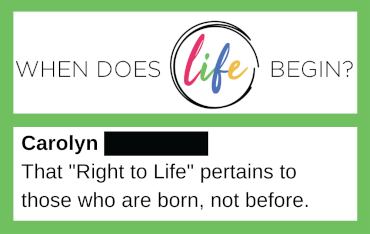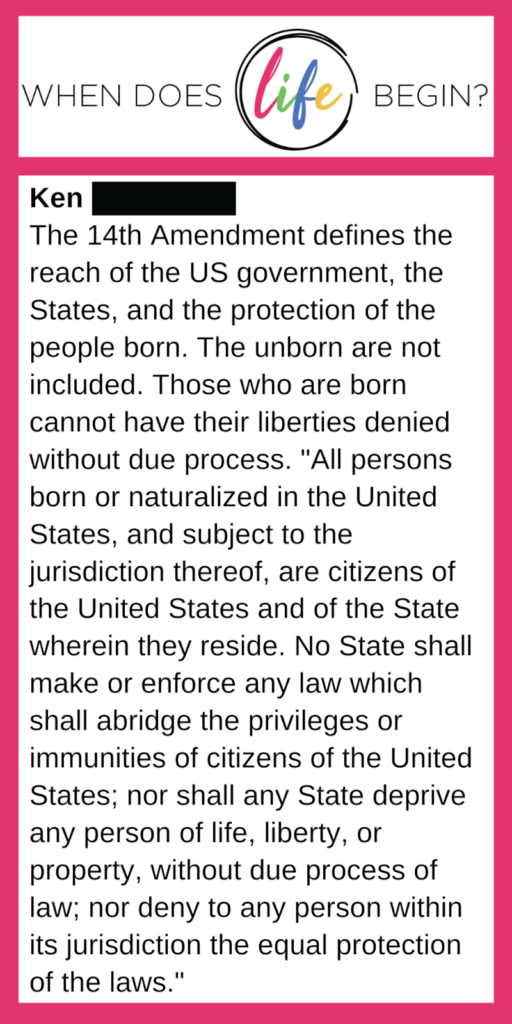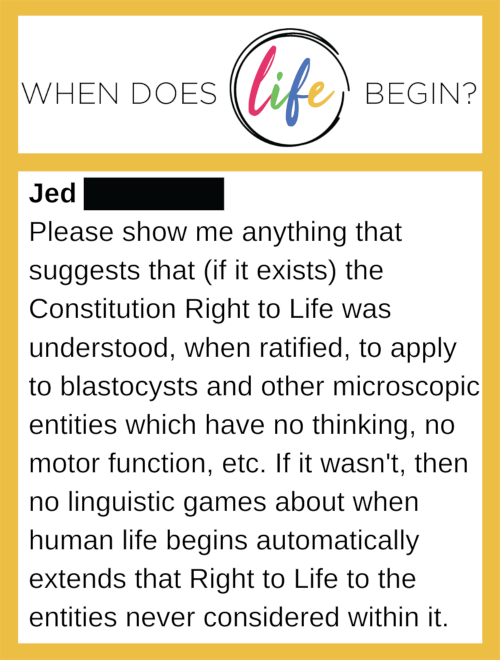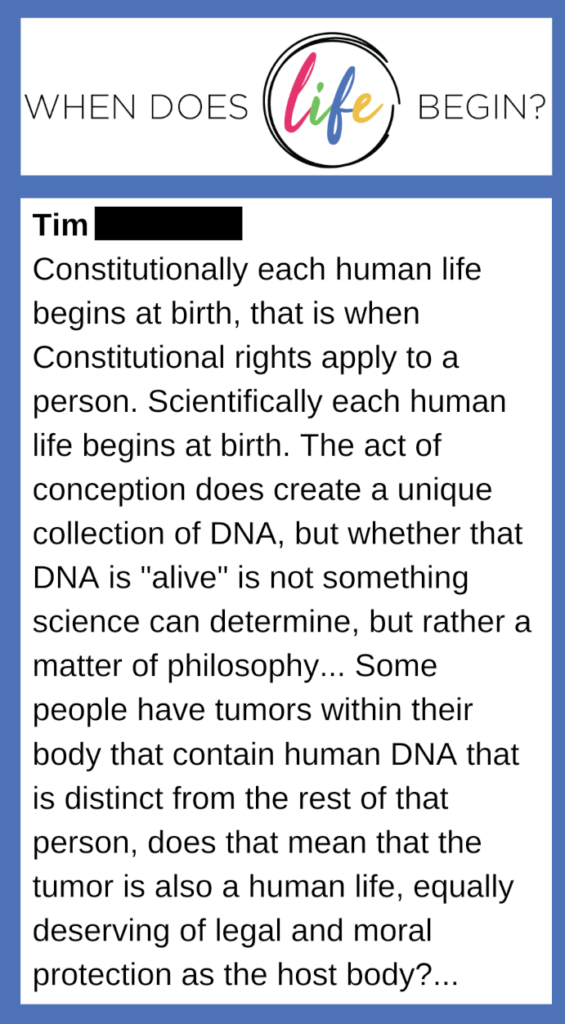
Carolyn, on what basis do you make that assertion? The Declaration of Independence and the Constitution assign our civil rights according to our core humanity – not level of development. Note the wording from the Constitution, “nor shall any State deprive any person of life, liberty, or property without due process of law;” Merriam-Webster dictionary defines “person” as “human”. Very accurate! A person is a human and a human is a person.
Please consider this quote below from Professor Micheline Matthews-Roth, Harvard University Medical School. “It is incorrect to say that biological data cannot be decisive…. It is scientifically correct to say that an individual human life begins at conception…. Our laws, one function of which is to help preserve the lives of our people, should be based on accurate scientific data.”

Ken, yes, the 14th amendment speaks to the rights of citizens and persons. The first sentence you quoted defines how citizenship is determined for persons. The second sentence quoted then first speaks to the specific protections for citizens and then more broadly for “persons” – “nor shall any State deprive any person of life, liberty, or property, without due process of law; nor deny to any person within its jurisdiction the equal protection of the laws.” We of course recognize that people – even non-citizens – have life, liberty and property protections.

Diane, please note the following regarding 1 US Code § 8:
1. Part (a) which you quoted simply states “the words ‘person’, ‘human being’, ‘child’, and ‘individual’, shall include every infant member of the species homo sapiens who is born alive at any stage of development.” Nothing in that statement excludes the unborn.
2. In fact, please note the further wording in part (c) just a few sentences later, “(c) Nothing in this section shall be construed to affirm, deny, expand, or contract any legal status or legal right applicable to any member of the species homo sapiens at any point prior to being ‘born alive’ as defined in this section.” This part SPECIFICALLY notes that nothing in that section denies the legal status or rights of humans prior to being “born alive”.

Jed, it is true that when the US Constitution was written in 1787, they did not have the scientific knowledge regarding genetics that we now have. However, as scientific understanding grew during the late 1800s and early 1900s every state in the US enacted laws outlawing abortion. The public and law makers recognized the humanity of the unborn.
Sadly, with the Great Depression, mass migration to cities from farms, and the sexual revolution of the 1960s, the value of children began to be diminished. This change in the social value of children did not change the unborn’s scientific designation as human beings, but unfortunately it did erode their legal protections.
Our society’s understanding and application of constitutional rights to freedom of speech, religion etc. have also changed over time and are continually fluctuating depending upon current norms. The right to freedom of speech is particularly being debated in our society right now – what is protected speech in social media, printed media, etc. But even as we continually debate and vary the application of our nation’s constitutional rights, the rights themselves remain and must be addressed.
The current Right to Life should be based on up-to-date modern scientific understanding of what is a human. Again, Steve Jacobs’ landmark study of 5,337 biologists from over 1,000 institutions across different cultures throughout the world found that 96% of biologists world-wide “affirmed that a human’s life begins at fertilization”.
A human is a human. The position of valuing one human life over another is the very basis of oppression throughout the world. Every human life has intrinsic value. When we start to put people in categories, we all eventually are put at risk.
Our nation’s body of law is all about establishing universal, objective human rights – that are not subject to the whims of bureaucrats, parents, or any other subjective decision maker. Our human rights should be protected on the objective basis of humanity. Our society and our world will in fact be improved as we protect ALL human beings.

Tim, you rightly state that tumors “contain human DNA.” That is totally different than an organism that IS genetically human – with the scientifically identifiable, complete 46-chromosome chain that makes them a member of the human family. We live in a society currently where the zeitgeist is that there are no objective facts. But facts are facts – not subject simply to “what we believe.” Some folks still disbelieve that the world is round. There is almost universal consensus scientifically that human life begins at conception. Steve Jacobs’ landmark study of 5,337 biologists from over 1,000 institutions – across different cultures – throughout the world found that 96% of biologists world-wide “affirmed that a human’s life begins at fertilization”.
Our nation’s body of law is all about establishing universal, objective human rights – that are not subject to the whims of bureaucrats, parents, or any other subjective decision maker. Our human rights should be protected on the objective basis of humanity. The science is clear.

Sandy, in the vast majority of cases pregnancy is the result of freewill action. With choice and freewill comes responsibility. It is that way with every other choice we make. You are incorrect to frame protecting an unborn human being as “forcing” someone to give birth.
You are also incorrect in stating that the woman is forced into parenthood. Adoption is often a great option for women, and it protects the very life of a fellow developing human.
Pregnancy does not last forever but abortion does. We can support and balance the rights of both born and unborn human beings. The position of valuing one human life over another is the very basis of oppression throughout the world. Every human life has intrinsic value. When we start to put people in categories, we are all eventually put at risk.
You are incorrectly framing this position as a religious argument. It is an issue of HUMAN RIGHTS. Please consider the following.
Dr. Jerome LeJeune, professor of genetics at the University of Descartes in Paris, was the discoverer of the chromosome pattern of Down syndrome. Dr. LeJeune testified to the United States Senate Judiciary Subcommittee, “after fertilization has taken place a new human being has come into being.” He stated that this “is no longer a matter of taste or opinion,” and “not a metaphysical contention, it is plain experimental evidence.” He added, “Each individual has a very neat beginning, at conception.”